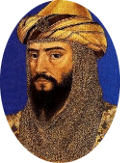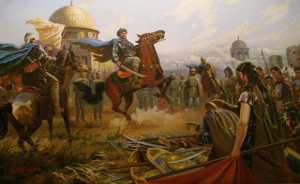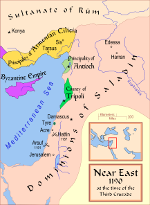Saladin: Medieval Muslim War Hero
One of the most feared and revered leaders of Muslim peoples and armies during the time of the Crusades was Saladin. 
He was born Yusuf Ayyub al-Dawinin in what is now Tikrit, Iraq, in 1137. He lived in Mesopotamia with his family until he was 10; then, his family moved to a city near the Nile River, in Egypt. Saladin studied a variety of subjects, including law, mathematics, philosophy, and religion. He learned to speak two languages, Arabic and Kurdish. He also trained very hard at being a soldier. Once he became a great warrior, he took the name Al-Malik An-Nasir Salah al-Din. The last part was shortened to the name by which Westerners know him best: Saladin. At age 14, Saladin trained under his uncle Shirkuh, a high-ranking officer in the army of the Muslim Sultan, Nur al-Din. Shirkuh and Saladin led a force to victory over a Crusader army in Egypt in 1169. Shirkuh later died, and Saladin took control of the army and declared himself the Emir of Egypt. Saladin became a trusted lieutenant of the reigning Sultan. When the Sultan died, in 1174, Saladin marched his forces to Damascus and declared himself Sultan. He then married Nur al-Din's widow, Ismat. Saladin was the first of the new Ayyubid Dynasty. He quickly seized Aleppo, later took Hama and Homs, and eventually conquered all of what is now Syria. The lands he controlled eventually extended into Yemen and North Africa. Other leaders didn't recognize Saladin's authority, and he spent 12 years defeating all challengers. By 1186, he was in sole control of the Sultanate. Saladin, in firm control, set about shoring up his armies. He also made a habit of taking Crusader castles and other militarily important locations. Armies from Western Europe had seized Jerusalem and many other parts of the Holy Land during the First Crusade, even creating four new territories known as the Crusader States. Saladin very much wanted to lead his armies to victory over the men running and defending the Crusader States. Saladin proved to be a brilliant military tactician. He and his forces took city and strategic spot after city and strategic spot, among them Acre, Caesarea, Jaffa, Nazareth, and Tiberias. The only military outpost that successfully resisted was Tyre, which proved to be a jumping-off point for later invasions by Crusaders. 
One of Saladin's most famous clashes with Western armies was the Battle of Hattin in 1187. He led the Western forces into a trap, then dealt them a devastating blow, seizing the territory and driving them away. This was a resounding victory for Saladin's forces; they took Jerusalem itself a few months later. Saladin prohibited any of the kind of wholesale slaughter that the victorious Crusaders had doled out when they had captured Jerusalem during the First Crusade. The loss of Jerusalem sparked a general panic in Western Europe, and Pope Gregory III launched another religious campaign, known as the Third Crusade. This was one of the most famous of the Crusades, with armies led by England's King Richard I, France's King Philip II, and Germany's Frederick I Barbarossa, also the Holy Roman Emperor. 
The Crusaders initially proved a match for Saladin's armies, scoring victories at Acre, Arsuf, and Jaffa. The defeat at Acre was particularly devastating for Saladin because the losses included 70 ships, most of his navy. However, the extensive fighting weakened the Crusader forces, and the French forces went home. The German forces had not been much of a factor because Frederick Barbarossa had drowned early on in the conflict and most of the German forces eventually left for Europe. Even though King Richard and what was left of the Crusader forces were within striking distance of Jerusalem, they didn't have the strength to take it. Richard and Saladin agreed to a truce. They signed the Treaty of Jaffa in 1192. As a result, Saladin held on to Jerusalem but granted Christian pilgrims safe right of passage so they could visit sites that they considered holy. A few months after signing the treaty, on March 4, 1193, Saladin died of a fever. His successors continued the Ayyubid dynasty until 1250. Saladin has become known as an effective commander and a successful military strategist. He was also known for his love of poetry and gardens. He was generous with his wealth, sharing it with his friends and family. Like others of his generation, he could also be cruel, and he coveted being a warlord in charge of an empire. He considered himself the leader of a holy war, and he personally killed several of his mortal enemies and ordered many more to be killed out of spite, selling still others into slavery. At the same time, he knew the value of a negotiated peace, as he demonstrated on more than one occasion. He is remembered a great warrior and a great uniter. |
|
Social Studies for Kids
copyright 2002–2026
David White




